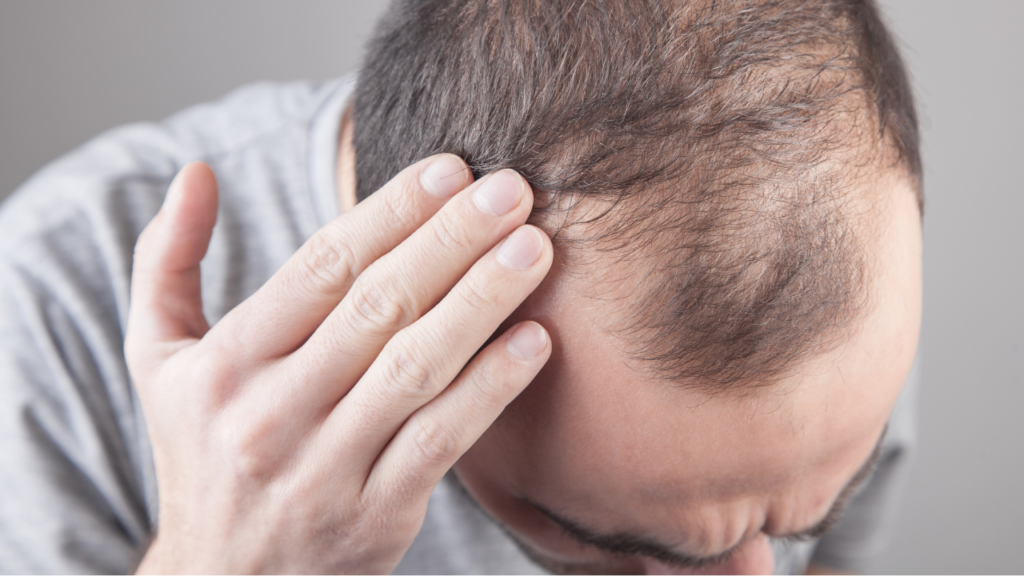Hair loss, medically referred to as alopecia, is a prevalent condition impacting individuals across all age groups. Its origins can be attributed to various factors such as genetic predisposition, hormonal imbalances, underlying medical conditions, or certain medications. Both temporary and permanent instances of hair loss can occur, affecting diverse areas of the body like the scalp, eyebrows, eyelashes, and more.

Within this context, our focus revolves around exploring the distinct types of hair loss, their root causes, and the available treatment options. Additionally, we aim to offer guidance on effectively managing hair loss and coping with the emotional toll it may take. Among the numerous hair loss variations, the most frequently encountered ones include
Androgenetic alopecia
The most prevalent form of hair loss is known as androgenetic alopecia, commonly referred to as male-pattern baldness or female-pattern baldness. This particular type of hair loss results from a combination of genetic factors and hormonal influences.
Alopecia areata
Alopecia areata is characterized by an autoimmune response wherein the body’s immune system mistakenly targets the hair follicles, resulting in patchy hair loss. This condition can present itself as either a temporary or permanent loss of hair.
Telogen effluvium
Telogen effluvium is a form of hair loss triggered by significant stress-inducing events like surgery, childbirth, or severe illness. Typically, this condition is temporary, and once the underlying stressor is alleviated, the hair will regrow naturally.
Traction alopecia
Traction alopecia arises from excessive pulling or rubbing of the hair. It is often observed in individuals who regularly don tight ponytails, and braids, or utilize hair extensions.
Causes of Hair Loss

- Genetics
Genetics plays a significant role in various forms of hair loss, notably in androgenetic alopecia. Additionally, alterations in hormones, such as those experienced during menopause, can also contribute to hair loss.
- Medical conditions
Hair loss can be attributed to certain medical conditions, like thyroid disease, lupus, and alopecia areata. These conditions can lead to varying degrees of hair loss in affected individuals.
- Medications
Certain medications, including chemotherapy drugs and oral steroids, have been identified as potential triggers for hair loss. The use of these medications can lead to varying degrees of hair loss in some individuals.
- Stress
Stress has the potential to induce telogen effluvium, a specific type of hair loss.
Moreover, physical trauma to the scalp, such as burns or injuries, can also be a contributing factor to hair loss.
What are the indicators and manifestations of hair loss?
The signs and symptoms of hair loss may differ depending on the specific type experienced. Nonetheless, some common indicators include:
- Increased hair shedding
- Patches of baldness
- Thinning hair
- Scalp irritation or dryness
- Changes in hair texture
Regarding treatment options for hair loss, they vary based on the type and underlying cause. However, some prevalent treatments include:
- Medications like minoxidil (Rogaine) and finasteride (Propecia)
- Surgical interventions, such as hair transplantation
- Light therapy
- PRP therapy (Platelet-Rich Plasma)
- Adopting lifestyle changes, such as stress management and maintaining a healthy diet.
Can PCOS hair loss grow back?

Hair loss caused by PCOS (Polycystic Ovary Syndrome) typically doesn’t resolve on its own. Female pattern hair loss occurs when testosterone is converted to dihydrotestosterone (DHT) within the hair follicle glands. DHT binds to receptors in the follicles and causes them to shrink. However, seeking treatment may facilitate the growth of new hair.
It is advisable to consult a healthcare provider to explore suitable treatment options. Our confident hormone club will guide you to understand all the reasons and how to treat it.
Rosemary oil for hair loss
Rosemary oil, derived from the medicinal plant Rosmarinus officinalis L., possesses various properties, including the ability to enhance microcapillary perfusion. This attribute could potentially account for its effectiveness in reducing hair loss and promoting hair.
The research presented supporting evidence for the effectiveness of rosemary oil as an alternative treatment choice for AGA (Androgenetic Alopecia).
How long does it take for rosemary oil to help hair loss?
The impact of rosemary oil in addressing hair loss can differ from one person to another. Some individuals might notice visible improvements in hair loss after a few weeks of using rosemary oil, while others may require several months of consistent usage before significant results become evident.
Patience and consistent application of rosemary oil are crucial to allow it sufficient time to work effectively. If you are using rosemary oil for hair loss, seeking advice from a healthcare provider or a dermatologist is recommended for personalized guidance and monitoring of your progress.
What is female pattern baldness/hair loss?
Female pattern baldness, also known as androgenetic alopecia, is a type of hair loss that impacts women and individuals assigned to females at birth. This condition leads to hair loss on the scalp, and without treatment, the hair doesn’t naturally regrow. Typically, female pattern baldness becomes more noticeable after menopause.
However, with appropriate treatment, which may involve medications, red light therapy, or styling techniques, the condition is reversible. It is akin to male pattern baldness, but the pattern of hair loss tends to differ between the two genders.
Can you regrow female pattern baldness?
With appropriate treatment, female pattern baldness can be reversible. This treatment may encompass medications, red light therapy, or various styling techniques. Effective treatment can not only halt further hair loss but also facilitate the regrowth of some hair.
- The application of topical medication can aid in slowing down hair loss and encouraging hair growth.
- Oral medication can be effective in reducing hair loss in men, but it is not FDA-approved for use in women.
- A surgical procedure involves transplanting hair follicles from one area of the scalp to another area.
- Light therapy, PRP(platelet-rich plasma), and others promote hair growth.
- Rosemary Oil is the best solution to regrow hair.
Telogen Effluvium vs. Female Pattern Baldness
Telogen effluvium is characterized by an increase in hair follicles entering the resting phase of the growth cycle, resulting in temporary hair loss. It can be triggered by various factors, such as stress, hormonal changes, or medications.
On the other hand, female pattern baldness affects women and individuals assigned female at birth, leading to hair loss on the scalp, and without treatment, the hair doesn’t naturally regrow. To distinguish between telogen effluvium and female pattern baldness, it is advisable to seek a healthcare provider’s diagnosis.
How to fix alopecia areata?
If you have concerns about hair loss, it is essential to seek medical advice and get a proper diagnosis from a doctor. Dr. Kaylee’s expertise and support through The Confident Hormone Club are invaluable resources for individuals dealing with hair loss and seeking to understand its underlying causes. Her guidance, along with The Confident Hormone program resources, ensures you are well-equipped to address hair loss and achieve optimal well-being.
They can help determine the cause of your hair loss and discuss suitable treatment options. Here are some additional tips that may aid in distinguishing between telogen effluvium and female pattern baldness:
- Share your medical history: Your doctor may inquire about your medical history to identify any recent stressful events or factors that could contribute to hair loss.
- Family history of hair loss: Female pattern baldness is often hereditary, so if there is a family history of the condition, it becomes more likely.
- Scalp examination: A doctor may examine your scalp for signs of inflammation or redness, which can provide valuable clues.
- Hair-pulling test: In some cases, a doctor may gently pull a few hairs from your scalp to check if they are in the telogen (resting) phase. An abundance of hairs in the telogen phase may indicate telogen effluvium.
By combining medical expertise and these tips, a doctor can offer a comprehensive assessment and guide you toward the most appropriate course of action for your hair loss concerns.
What hormone causes hair loss in females?
In females, the primary hormone responsible for hair loss is dihydrotestosterone (DHT). DHT is a byproduct of testosterone and is generated in the body through the action of an enzyme called 5-alpha reductase. Compared to testosterone, DHT is more potent and has the ability to bind to receptors on hair follicles, leading to their shrinkage. As the follicles diminish in size, they become unable to sustain hair growth, ultimately resulting in hair loss.
- Estrogen, a female hormone, plays a crucial role in maintaining the health and strength of hair. Nevertheless, reduced levels of estrogen can contribute to hair loss.
- Thyroid hormones play a vital role in various bodily functions, including hair growth. Insufficient levels of thyroid hormones can result in hair loss.
- Stress has the potential to trigger telogen effluvium, a temporary type of hair loss. This condition is induced by stressful events, such as surgery, childbirth, or a major illness.
What is the best vitamin for thinning hair?
The ideal vitamin for thinning hair varies for each individual, and there is no universal solution. Nonetheless, certain vitamins have demonstrated potential benefits for promoting hair growth. Some of these vitamins include:
- Biotin, a vital B vitamin, plays a crucial role in promoting hair growth. Its function involves converting food into energy, which is essential for supporting healthy hair growth.
- Folate, another significant B vitamin, is essential for hair growth. Its role involves facilitating the production of new cells, a crucial process necessary for promoting healthy hair growth.
- Iron, a vital mineral, is indispensable for hair growth. It assists in transporting oxygen to the hair follicles, a crucial factor necessary for promoting healthy hair growth.
- Iron, an essential mineral, plays a crucial role in hair growth. Its function involves transporting oxygen to the hair follicles, which is a vital factor necessary for fostering healthy hair growth.
- Vitamin C, an antioxidant, plays a protective role for the hair, shielding it from damage. Additionally, it aids in collagen production, a vital protein essential for maintaining hair strength.
- Vitamin E, another antioxidant, contributes to safeguarding the hair from damage. Furthermore, it enhances blood circulation to the scalp, an essential aspect for promoting healthy hair growth.
Apart from taking vitamins, there are various other practices you can adopt to promote hair growth, including:
- Aiming for 7-8 hours of sleep per night, as it is crucial for healthy hair growth.
- Find healthy ways to manage stress, such as practicing yoga, meditation, or spending time in nature, as stress can trigger hair loss.
- Maintain a healthy diet that includes plenty of fruits, vegetables, and whole grains to keep your hair healthy and strong.
- Use a mild shampoo and conditioner designed for your hair type to avoid scalp irritation and worsened hair loss.
- Minimize the use of heat styling tools on your hair, as they can cause damage and make it more prone to breakage.

